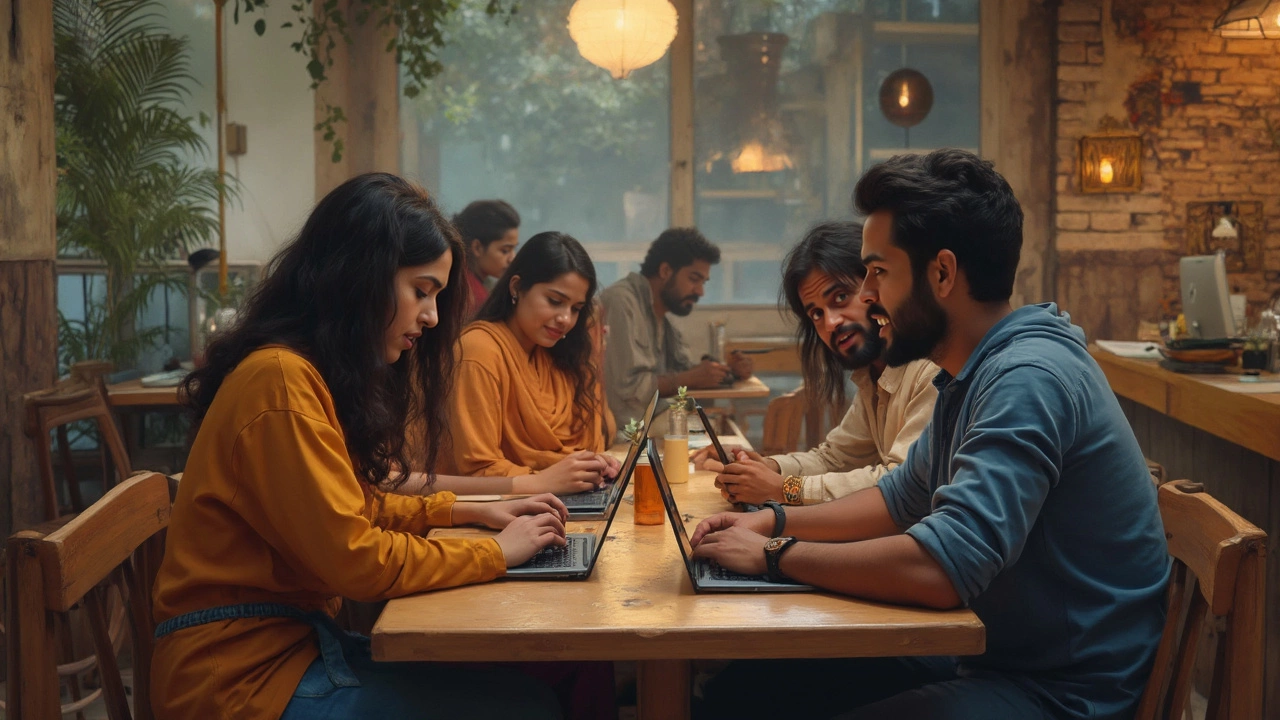Thinking about teaching yourself to code? It's not as intimidating as it might sound. Many people start this journey and quickly discover that with dedication and the right steps, it’s totally feasible. So, where do you start?
First off, why does self-teaching work so well? Because you set the pace. Depending on your schedule and life commitments, you can learn quickly or take your time. You aren't bound by classes or rigid structures. This flexibility means you can dive into topics that interest you the most.
Choosing the right programming language is crucial. Ask yourself: what do you want to achieve? Want to build websites? Look into HTML, CSS, and JavaScript. Interested in data analysis? Python might be your new best friend. Knowing which languages suit your goals can save heaps of time.
- Why Self-Teaching Works
- Picking the Right Languages and Tools
- Setting Realistic Goals
- Overcoming Common Challenges
- Keeping Motivation High
Why Self-Teaching Works
Self-teaching can be a game-changer when it comes to learning to code. One of the biggest perks is the ability to tailor your learning experience to suit your personal goals and interests. You're in the driver’s seat—deciding what, how, and when you learn.
Flexibility is everything. Unlike formal classes, you don't have to worry about strict deadlines or rigid schedules. This means you can learn coding at your own pace, which is perfect if you're juggling other commitments. Dive into coding during your lunch break or a Saturday afternoon—it's all up to you.
"Self-learning, especially in the tech field, allows for a more project-based focus. This often aligns more closely with real-world application than traditional education." – TechCrunch
There's also the satisfaction of solving a problem on your own. When you teach yourself, you get to experience that 'aha' moment when you finally crack a tough bit of programming. This can be incredibly motivating and keep the momentum going.
Access to a Wealth of Resources
We're living in a digital age where information is everywhere. You can find countless online tutorials, forums, and coding communities ready to help out beginners. Platforms like Codecademy, freeCodeCamp, and Coursera offer structured paths for those who prefer some guidance but don't want to enroll in full-time classes.
- Codecademy: Interactive lessons in popular languages.
- freeCodeCamp: Comprehensive courses with real-world projects.
- Coursera: Offers university-level courses in various programming fields.
Networking is another factor. Self-learners often build extensive networks as they engage in coding communities and online forums. This can open doors to collaboration, feedback, and even job opportunities.
Finally, self-teaching fosters a mindset of lifelong learning. When you've figured out how to learn independently, it becomes a skill you can apply to any new challenge. This is invaluable in the ever-evolving tech landscape where new languages and technologies are always emerging.
Picking the Right Languages and Tools
When you're on the mission to learn coding on your own, selecting the right languages and tools is a game-changer. Your choice can greatly influence the speed and ease with which you become proficient. So, how do you pick them?
Match Your Goals with the Language
Understanding your end goal is crucial. Want to create sleek, interactive websites? You might want to start with HTML, CSS, and JavaScript. Looking at pursuing a career in software development or data science? Dive into Python or Java. These languages have broad applications and strong communities behind them. JavaScript, for example, is essential for web development, while Python excels in data-related projects.
Consider Community and Resources
One huge plus is having a language with a big community. The more popular the language, the more resources you’ll find online. Forums, tutorials, and open-source projects can be lifesavers. Python, for instance, often has excellent documentation and countless learning resources spread across the Web.
Don’t Forget the Tools
Languages are just one part of the equation. Make sure you’re using the right tools, too. Here are a few to consider:
- IDEs: Integrated Development Environments like Visual Studio Code or PyCharm can streamline your workflow.
- Version Control: Learning Git and platforms like GitHub early can be a huge help in managing your projects.
- Text Editors: Simple tools like Sublime Text or Atom for clean code editing.
Remember, the key is to start simple and then expand as you grow more comfortable with the environment. There's no rush; everyone learns at their own pace.
Spotlight on Data
Lately, Python has become the go-to for many aspiring self-taught coders, and here's why:
| Programming Language | Stack Overflow Community Size |
|---|---|
| Python | 9 Million+ |
| JavaScript | 13 Million+ |
| Java | 10 Million+ |
As these numbers show, you have a wealth of resources and community support for languages like Python and JavaScript. Use these to your advantage as you get started.

Setting Realistic Goals
Achieving success in teaching yourself to code starts with setting realistic goals. It's easy to feel overwhelmed when you see how much there is to learn, but breaking it down into manageable chunks can make all the difference.
Start Small
Begin with achievable targets that build confidence. For instance, aim to understand the basic syntax of the programming language you're learning, or complete a simple project. These smaller goals provide quick wins that keep you motivated.
Plan Your Learning Journey
Create a roadmap of what you want to accomplish. For example, if your end goal is to develop a mobile app, outline the steps you'll need to get there. This might include mastering Java or Swift, understanding UI/UX principles, and learning about APIs.
Consistency is Key
Regular practice beats cramming in long sessions once in a while. Aim to dedicate some time every day to your coding practice. Even short, consistent sessions are often more effective than sporadic bursts of learning.
Track Your Progress
Keep a journal or use an app to log your weekly achievements and setbacks. Reflecting on what you've learned and recognizing your progress can be incredibly rewarding, providing a clear view of how far you've come.
Sample Goal Outline
| Goal | Time Frame |
|---|---|
| Understand HTML basics | 1 Week |
| Create a basic website | 2 Weeks |
| Learn JavaScript fundamentals | 1 Month |
Remember, the key is to keep these goals realistic and personalized to your pace and interests. This method ensures that you not only learn but also enjoy the process of gaining new skills.
Overcoming Common Challenges
Diving into coding by yourself is exciting, but let's be honest, there are plenty of bumps along the way. Here, we’ll go over some common hurdles and how to leap over them gracefully.
Feeling Overwhelmed
Remember when you first learned to ride a bike? It was awkward until, suddenly, something just clicked. Coding can feel like that, especially with the sea of information out there. Solution? Break learning into small tasks. Each week, focus on one concept or skill. Keep this learn coding journey simple and digestible. You'll find that small, steady steps lead to big accomplishments.
Struggling with Bugs
Ah, bugs. The uninvited guests in every coder’s world. They can be frustrating, but they’re solvable! Always meticulously read error messages—they're your roadmap to fixing issues. And hey, Google is your buddy here. Most times, someone else has encountered (and solved) a similar problem online.
Staying Motivated
Without a classroom or a teacher to keep pushing you, it’s easy to lose steam. Set regular goals, reward yourself for reaching them, and join communities of like-minded learners. Surrounding yourself with fellow programming skills enthusiasts does wonders for motivation!
Time Management
We're all busy, but you can weave coding into your life. Dedicate specific times for practice each week. Whether it’s an hour every other morning, or a weekend cram session, consistency is your best friend here.
If you can manage these hurdles, you'll find that teaching yourself to code becomes less of a mountain and more of an adventure. Those challenges? They’re badges of honor along the way!

Keeping Motivation High
Staying motivated while learning coding on your own can be tough. It's like running a marathon; you need endurance. Here’s how to keep the fire burning.
Celebrate Small Wins
Every time you learn something new or solve a tricky problem, take a moment to celebrate. These small achievements add up and can give you the confidence boost you need to tackle bigger challenges. It doesn’t have to be a grand celebration—a simple treat or a break could do wonders.
Join a Community
Learning doesn’t have to be lonely. Join online forums, coding groups, or social media communities dedicated to self-taught programming. Platforms like GitHub or Stack Overflow are excellent for finding like-minded people who can offer advice and encouragement. Sometimes chatting with someone who’s been in your shoes can reignite passion.
Set Clear Milestones
Break your learning journey into specific goals. Maybe it's mastering a certain programming language by the end of the month or building a mini-project each week. Having clear milestones helps track progress and makes the task at hand feel more manageable.
Mix Up Your Learning
Dive into different resources like video tutorials, podcasts, or even coding games. Keeping your learning diverse can prevent it from feeling monotonous. Sites like Codecademy or freeCodeCamp offer various interactive ways to grasp new concepts and keep things interesting.
Track Your Growth
When you’re feeling stuck, look back at how far you’ve come. Keep a journal or digital log of your progress. It’s amazing to see the transition from coding newbie to someone who can handle complex problems. This not only boosts motivation but also gives you a personal record of your coding journey.

